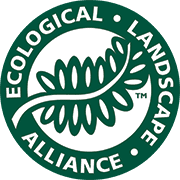By Roger Sturgis
Organic lawns are the way to go. The “Scott’s” perfectly green, weed-free carpet should not be the pride of the neighborhood. However, it takes a confident neighbor to put up with the suburban scorn for a less-than-perfect lawn. For the environment, and for many of the neighbors,”perfect lawn” would be redefined as something that requires less pesticides to maintain.
From a professional integrity side, anyone who sells organic programs needs to do two things: 1) sell an actual organic program, and 2) Tell the potential client that they have to have realistic expectations about the results. In most cases that means lowering expectations.
Potential clients I talk to are sold an “organic” program with the understanding that there will be no pesticides and often, no chemicals. Then they are told that they will need to apply grub control, a pesticide, and crabgrass control, a pesticide, This is not what an organic program is supposed to be. Apparently, to a scientist, everything is organic. Most of the time the people who buy an “organic” lawn care program expect pesticide and synthetic fertilizer free. What they get is different. What should be widely sold, and explained, is IPM with little decrease in results and more honesty. IPM is Integrated Pest Management, using pesticides only when needed.
People sell organo-pesticides. They say everything is carbon based, so every fertilizer is organic. Deceitful, but not illegal advertising, is pervasive in our industry as in all others. There is also a lot of ignorance. In eastern Massachusetts there is no organic control for crabgrass, except shade. There is no organic control for grubs, except shade. There is no organic control for broadleaf weeds, except luck.
Nurseries and garden centers in our area should not sell milky spore for grub control. Corn gluten should not be sold as a pre-emergent crabgrass control. They do not work, at least in our area, and there is no research that would indicate otherwise (my source for this, generally, is the U. Mass Amherst Plant and Soil Lab). With our garden centers putting out misinformation to the masses, and Paul Parent being a pro-pesticide horticulturalist, it is hard for the rest of us to make headway with the public. I have adopted a purely IPM approach: minimize pesticide use, rather than eliminate it, without lowering expectations. I feel that I have sold out to some extent, and I do not feel especially good about it. But hey, I’m a guy and I don’t like to lose.
Purely organic is best for the environment and best for the world but I would like to see widespread honesty in our interaction with the lawn care consuming public. IPM provides the results the public wants and dramatically reduces pesticide use. Selling IPM rather than the “perfect” carpet would dramatically improve the reputation of the lawn care industry as well.
Roger Sturgis has been a professional landscaper since 1969, Roger Sturgis & Associates

